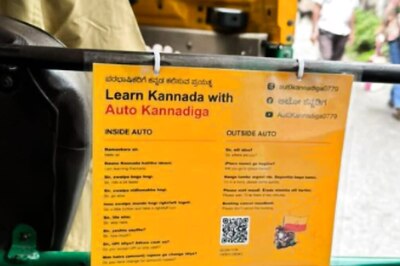
views
New Delhi: The year was 2015. Nitish Kumar had relinquished power to Jitan Ram Manjhi after facing defeat in 2014 elections. Prashant Kishor was looking out for a new opportunity after working for Narendra Modi’s successful campaign in 2014. The two met and now that partnership may script a new chapter in Indian politics with Nitish hinting at Kishor as his political successor, one unrelated by blood.
Succession battles are often known to be bitter and bloody in India, but that’s when it’s bloodline transition. Uttar Pradesh witnessed such a battle when Mulayam Singh Yadav passed the Samajwadi baton to his son Akhilesh Yadav, while brother Shivpal, the real organisational man, sulked and eventually fell in line.
The generational shift played out on the streets of Lucknow and led to sabotage in Assembly elections that followed, with Samajwadi Party workers owing allegiance to Shivpal refusing to campaign for candidates chosen by Akhilesh. To date, the chacha and bhatija share an uneasy relationship. The former has even floated his own outfit to dent his nephew’s electoral prospects.
In Tamil Nadu, the succession from DMK patriarch Karunanidhi to his son MK Stalin after the former’s death was anything but smooth despite the Kalaignar having settled the dispute in favour of Stalin during his lifetime. The change of guard saw its fair share of drama with Alagiri putting up a fight, however meek.
In a polity where blood is given preference and is trusted over relationships built on common vision and understanding, Bihar may offer India a different spectacle with Kishor, the fabled election strategist, joining Nitish’s JD(U). He is likely to be given a role in the Bihar government in the next few weeks. The formal induction took place at the state executive on Sunday with Nitish telling his party men — “Prashant is the way forward”.
Kishor, too, took to Twitter, announcing the commencement of a new chapter. “Excited to start my new journey from Bihar,” he said.
In January 2016, within weeks of taking charge as the chief minister for the 6th time, Nitish Kumar’s cabinet notified the Bihar Vikas Mission. It was the brainchild of Kishor and the idea was to create “a first-of-its-kind CMO” in India; a work space where “politics and policy will come together in creating a system that will act as a facilitator and a force multiplier”.
Nitish had hoped that by appointing Kishor as the advisor, he would ensure the latter remains in Patna. The ambitious Bihar Vikas Mission couldn’t take off as Kishor moved to greener pastures after the Bihar elections.
Soon after, Kishor worked for the Congress in Punjab and Uttar Pradesh. During this period, there wasn’t much communication between Kishor and Nitish except for personal courtesies, but the CM was quoted as saying that “Prashant is family”. That’s a phrase often used in politics to avoid further questions on equations between two individuals who want to keep the door open for each other.
What followed a few months later in Bihar was a huge surprise, even for the murky world of Indian politics. The Mahagathbandhan of JD(U)-RJD-Congress collapsed and Nitish Kumar returned to the BJP. However, the rules of engagement between Nitish and the new BJP under Amit Shah and Narendra Modi had changed. The Lok Sabha elections of 2014 had made Nitish an insignificant player in national politics with just 2 MPs in the Lok Sabha.
Despite repeated statements by BJP leader Sushil Modi that Nitish Kumar will be the face of the NDA in 2019 Lok Sabha elections and the next Assembly elections, Nitish remains unsure and his future seems uncertain. An expansionist BJP today is better placed to bargain in Bihar. Moreover, Kumar fears that his core constituency is at risk from RLSP’s Upendra Kushwaha.
Muslims in the state, another important constituency, would be more comfortable with a Lalu Prasad Yadav and Tejaswi-led RJD than with the Nitish-BJP combination.
Nitish’s image as the ‘Sushasan Babu’ has also been threatened by incidents of communal violence and the Muzaffarpur shelter home scandal. Kumar clearly seems to be losing grip over the law and order situation in the state. The delayed decision to sacking social welfare minister Manju Verma came only after a relentless media campaign. Coalition compulsions made him delay the arrest of BJP’s Arijit Shashwat, son of Union Minister Ashwini Choubey, in the Bhagalpur violence case. When he eventually did surrender, Shashwat turned it into a media event, openly mocking the state machinery.
Some BJP leaders in the state like Giriraj Singh continue to take potshots at Nitish, leaving JD(U) leaders to wonder whether these jibes have the top leadership’s sanction.
Though BJP sources say NDA allies will get “respectable” seat-sharing deals in 2019, Nitish’s future in the absence of a winning caste equation and a robust party organisation is dicey.
So, is Kishor an insurance against this uncertain future? Sources in JD(U) say Kumar and Kishor connected more frequently after the Congress-SP defeat in Uttar Pradesh humbled the latter. Nitish, too, realised that his image had taken a huge hit after his political volte-face in 2017, virtually closing the door on any return to the secular front.
Over several breakfasts, lunches and dinners, Nitish is said to have reiterated that Kishor must return to Bihar and be a part of his establishment, both government and party. “Sab kuch aapko dekhna hai. Aap sochiye. Aap Bihar ke hain, Bihar ke bhavishye ke baare mein sochiye (You have to see and think. You are from Bihar, think about Bihar’s future),” is what Nitish reportedly told Kishor.
Sources say Nitish has proclaimed in front of his closest aides that it would be “Kishor deciding the way forward for the JD(U)”.
“We aren’t surprised. It was waiting to happen,” said a bureaucrat considered to be close to the Chief Minister.
Kishor, who functioned out of 7, Circular Road for months during the elections, has his bags still at the CM’s residence.
Nitish may well have set the succession process in motion on Sunday. He has often said how dynastic succession is feudal in nature. Though coalition compulsion made him accept Tejaswi Yadav as deputy CM in the Mahagathbandhan days, it’s known in political circles of Bihar how he would often talk about his comfortable working equation with BJP’s Sushil Modi, his deputy for years.
In the last few years across India, we have seen rise of several sons and daughters in politics. In Bihar, too, Chirag Paswan is now the boss of the LJP, Tejaswi Yadav has taken charge of the RJD in his father’s absence, but Nitish may well be breaking a norm in Indian politics on power transitions.


















Comments
0 comment